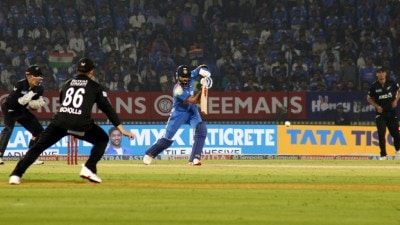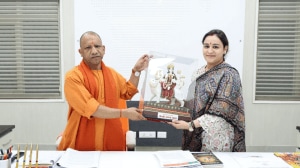Click here to follow Screen Digital on YouTube and stay updated with the latest from the world of cinema.
Applause/ Songs and stories
Teejan Bai brings Pandavani, a traditional performing art form of Chhattisgarh to Pune Her voice, raspy and deep, tells tales of strong warriors, beautiful princesses and wise, bearded old men. But don’t be fooled by her crude make-up or rustic, colourful clothes. The 57-year-old Teejan Bai, who was born in a Pardhi (a tribe) […]
Teejan Bai brings Pandavani, a traditional performing art form of Chhattisgarh to Pune
Her voice, raspy and deep, tells tales of strong warriors, beautiful princesses and wise, bearded old men. But don’t be fooled by her crude make-up or rustic, colourful clothes. The 57-year-old Teejan Bai, who was born in a Pardhi (a tribe) family in Atari in Chhattisgarh, bubbles over with enthusiasm and wisdom collected from Indian myths and legends.
Teejan Bai is an exponent in the Pandavani style — a traditional performing art form from Chhattisgarh, in which the artiste enacts tales from Mahabharata, with musical accompaniments. “I first heard the songs from Mahabharata from my grandfather in my village. I was mesmerised by the music,” she says. “There are two types of Pandavani performances — Vedamati and Kapalik. In the former, the narrator sits on the floor crossing his/her feet and makes a plain statement of facts as they happened, while in the latter, the story-teller enacts the story through actions and expressions. I perform in the Kapalik Shaili,” she explains.
Her voice, which can go from booming to soft, emotional to pathetic in a heartbeat, is only accompanied by a traditional tambura, which she holds in her hand and plays. “Some of my favourite stories are the Draupadi vastra haran and the heroic tales of Bheem, Duryodhan and Arjun. The audience loves them too,” she says. Ask her about the relevance of these stories, particularly the ones pertaining to the tragic heroines from Mahabharata in the modern society, Teejan Bai says hesitatingly, “The reactions of the audiences differ with each city and each story. I don’t know about the cultural impact of the modern relevance. I only know how to tell a story,”says the Bhilai-based artiste. Her performances, however, are peppered with clever observations, cheeky suggestions and topical innuendos.
Teejan Bai, who learned to read and write on her own, says that it was difficult to carve a niche for herself in a male-dominated society, that too in the performing arts, where women performers were rare and infamous. She first performed when Teejan Bai was 13, says that she goes on stage without any practice or rehearsal. “I simply know the words from the canon. I perform according to the venue, city and the type of audience,” says the artiste who won the Padma Shri Award in 1988, Sangeet Natak Akademi Award in 1995, and the Padma Bhushan in 2003. She has also performed across the world in countries such as France, Switzerland, Germany, Italy, and England, among others.
Exploring displacement
The 38th Vikram Sarabhai International Arts Festival (January 10-12) focussed on the theme of displacement, with its various levels and complexities. The first day saw the staging of Unearthed. Directed by Mallika Sarabhai and Yadavan Chandran, Unearthed is Gowri Ramnarayan’s adaptation of a short story by Gabriel Garcia Marquez into a physical theatre performance. On the second day, Revanta Sarabhai explored the complexities and displacement of long-distance relationships in the multimedia performance LDR. The third day , the play The Dammed by Naomi Deira was staged. All performances were held at Symbiosis Vishwabhavan Auditorium in Pune. The festival was held in Ahmedabad in December 2013, and after being staged in Pune, the performances are set to travel to other cities including Delhi — from March 10 to 12, and Mumbai — from April 15 to 17.
- 01
- 02
- 03
- 04
- 05


































